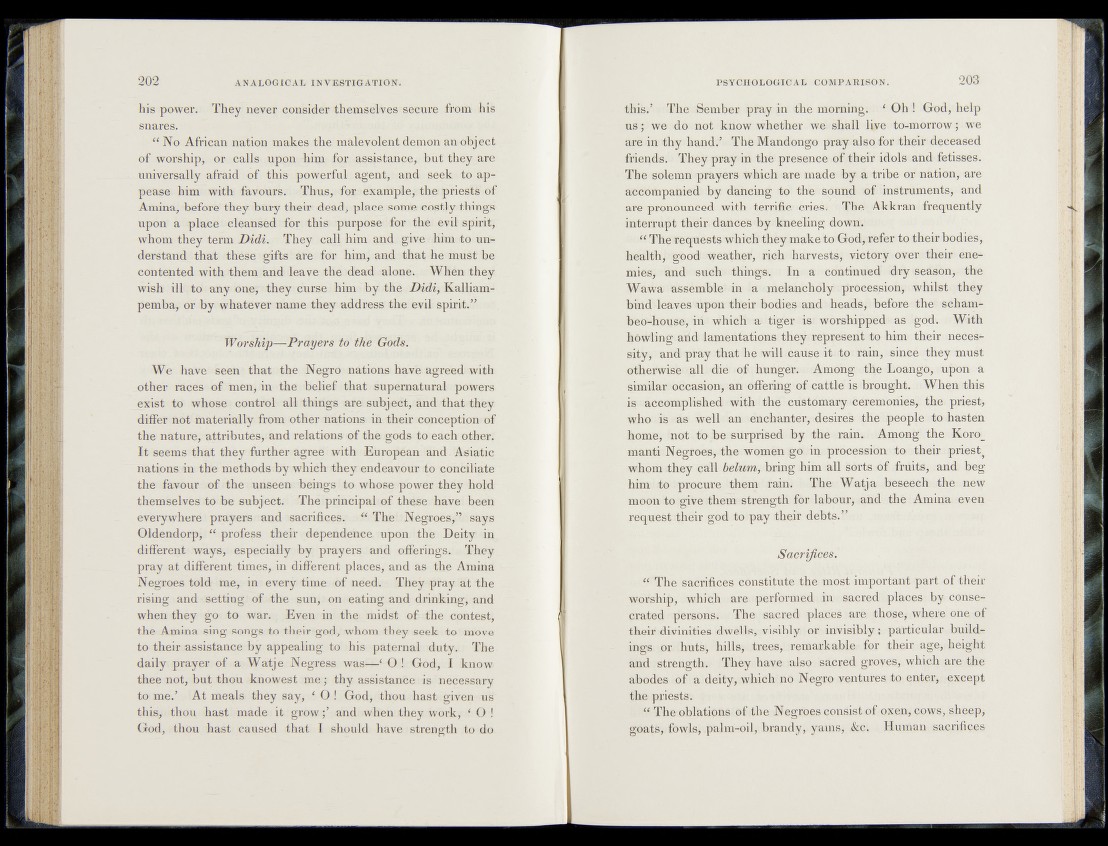
his power. They never consider themselves secure from his
snares.
“ No African nation makes the malevolent demon an object
of worship, or calls upon -him fbr assjstanceyr but they -are
universally afraid of this powerful agent, and seek to appease
him with favours. Thus, for example; the? priests of
Amina, before they bury their dead, place some costly things
upon a place cleansed: for this purpose for thè evil spirit,
whom they term JDidi. They call him and give him to understand
th a t th è se ' gifts are for him, and that he must be
contented with them and leave the dead alone. When they
wish ill to any one; they curse him by the Didi, Kalliam-
pemba, or by whatever name they address the evil spirit.”
Worship—Prayers to the Gods.
We have seen that the Negro nations have agreed with
other races of men, in the belief that supernatural powers
exist to whose control all things are subject, and that they
differ not materially from other nations; in theirconceptionof
the nature, attributes, and relations of the gods to each other.
I t seems that they further agree with European and Asiatic
nations in the methodsby which they endeavour to conciliate
the favour of the unseen beings to whose power they hold
themselves to be subject. The principal of these haves: been
everywhere prayers and sacrifices. u The Negroes,” says
Oldendorp, “ profess their dependence upon the Deity in
different ways, especially by prayers and offerings» They
pray at different times^ in different places, and as the Amina
Negroes told me, in every time of need. They pray at the
rising and setting of the sun, on eating and drinking, and
when they go to war. Even in the midst of the contest,
the Amina sing songs to their-god, whom they seek to move
to their assistance by appealing to his paternal duty. The
daily prayer of a Watje Negress was—‘ O ! God, I know
thee not, but thou knowest me; thy assistance is necessary
to me.’ At meals they say, ‘ O f God, thou hast given us
this, thou hast made it grow ;’ and when they work, i O i
God, thou hast caused th a t I should have strength to do
tfcfe/ Thetfismber pray in *tbe morningi | Oh! God, help
u s; we do; not know whether wecshall liye to-morrow; we
are in thy hand.’ TheiMaadongo pray al^p tor their deceased
Mends.- They prayln thes presence of their idols and fetisses.
The solemfi pTayers which are made by a tribe nation, are
accompanied by dancing to theosound ©fshistrumentsy and
are pronounced with terrific cries* The Akkran frequently
interrupt their- dances by kneeling downy '
“ The requests which they make In God^ refer to their bo dies;
health, gOod weather, rich h&vests, victory over their ene*
mies, and such things. In a continued dry sehson, the
Wawa assemble1 in
bind leaves upon theiribodies and - beads; I before the1- se-ham-
beO-house, in which a tiger is: worshipped- as Igobb With
howling arid lamentations they represent to him ; their neces*-
sityj- and pray that he will cause itito rain, smce :they must
otherwise;; alL da©; of i hungete Among the Loang®, rnpon a
similar occasion; an ©fferihg of cattle Is brought. ; When this
Is accomplished with the customary ceremonies, the; priest;
who is as well an enchanter, desires the p e o p je to hasten
home, not toybe surprised by the rain,, Among the Koro_
mantis N@gf®«s,othe women goi in procession - to their ; priest^
whom they call belum, bring him all sorts Of ifruits, and beg
him to procure them rain. The Watja beseeeh the -nevs'
moon to give lhem strength for labour, and the Amina even
requesttheir g o d to p a y their debts.”
Sacrifices.'
“ The sacrifices constitute the-most important part of their
worship, which are performed» -in -places by c<mse->
crated personsi The sacred; places are those,^where ©n%>bf
their divinities dwells, visibly: or invisibly; particular, buildings
or huts, hills, trees, remarkable - for their age,, height
and strength. They have iafso sacred groves, which are the
abodes of a deity, which no Negr© yentures tQ; enter, except
the priests.
“ The oblations of the Negroes consist of oxen> cows, sheep,
goats, fowls, palm-oil, brandy, yams, .<fcc, Human sacrifices